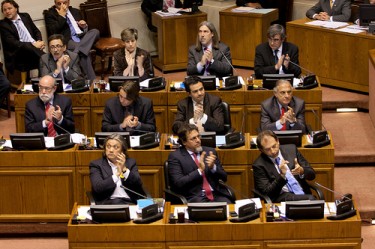[All links lead to Spanish-language websites unless otherwise stated]
While the Senate continues to postpone the debate over the decriminalization of therapeutic abortion, the exchanging of opinions has continued unabated in Chilean cyberspace, most noticeably following televised debates on the subject on two Chilean TV programmes. Subsequently, the hashtags #aborterapeutico (“therapeutic abortion”), #tolerancia0, #t0, and #VP (all three referring to the TV programmes) became trending topics in Chile.
The bill was due to be debated in the senate on August 2, 2011, but to this day has not yet been introduced, due to the introduction of other more, or less, urgent bills.
Below are the highlights of the comments made on Twitter during the televised debates.

Chilean Senate. Picture by Flickr user congresochile (cc by 2.0)
Debate on TV programme ‘Tolerancia Cero’‘
During the programme ‘Tolerancia Cero’ on March 18, Pato Linsky (@Patolinsky) stressed that:
En un debate televisado sobre el Aborto a la que menos le dieron la palabra fue, adivine usted, a la única Mujer presente.
#EsteEsChile#T0
In a televised debate on abortion, the person given least airtime was, you guessed it, the only woman involved. #EsteEsChile [“This is Chile”] #T0
Giorgio Jackson (@GiorgioJackson), a student representative, condemned one of the speakers, saying:
Es muy violento lo que dice el doctor de la U Andes… Lo peor es q cree q tiene la autoridad moral para decidir por miles de chilenas.
#T0
It's very violent what the Doctor from Andes University is saying… and worst of all, he thinks he has the moral authority to make a decision on behalf of thousands of Chilean women.#T0
Meanwhile @JAVIERLABRIN, a student, defended the right of the conservative Dr. Illanes to give his opinion:
En 1 debate exento d argumentos moralistas y religiosos, Dr. Illanes, U andes, planteo su postura y, nos guste o no, se debería respetar
#T0
In a debate dominated by moral and religious arguments, Dr. Illanes from Andes University made his position clear and, whether we agree with him or not, it should be respected. #T0
Twitter user Trini (@Sita_Tri) congratulated one of the moderators:
Bien Paulsen, al final esta no es una discusión científica, si no que ideológica
#T0#aborterapeutico
Well done Paulsen, ultimately this is not a scientific debate but an ideological one. #T0#aborterapeutico
Jessica Riquelme (@JessRiquelme) asked:
si en
#t0 dejaron claro q en caso de riesgo de vida de la mujer el médico está obligado a terminar el embarazo… que estamos discutiendo??
If on #t0 [TV programme ‘Tolerancia Cero’] it was made clear that in cases where a woman's life is at risk the doctor is obliged to terminate the pregnancy… then what are we debating??
Debate on TV programme ‘Vía Pública’
Following that, on March 19, during the programme ‘Vía Pública’ on station TVN, the well-known Twitter user Elquenoaporta (@elquenoaporta) said:
Prohibir el aborto de un feto inviable por razones ideológicas es tan ilógico como obligarlo. Las creencias no se imponen.
#VP
Making it illegal to ban an inviable fetus for ideological reasons is as illogical as making it obligatory. Beliefs should not be imposed on others. #VP
To which, dentist Felipe González (@Felipedental) replied:
@elquenoaporta y quien habla de obligar a abortar? La discusión es que existan todas las opciones
@elquenoaporta and who says anything about making abortion obligatory? The debate is about having all the options available.
While Igraine (@Igra_ine) said:
#VP si ud quiere llevar feto inviable 9 meses en su útero, bien por usted, pero si otra persona no quiere hacerlo, debe tener la opción.
#VP if you want to carry an inviable fetus in your womb for 9 months, good for you, but if someone else doesn't want to do that, then they shouldn't have to.
And law student Caroola (@Carooola) added:
Interesante el debate en
#VP .El problema radica en no separar las creencias de las políticas públicas,sin hacer eso no hay avance
Interesting the debate on #VP [TV Programme ‘Vía Pública’]. The problem centres on politicians being unable to leave their public beliefs out of the debate. If that doesn't happen, there will be no progress.
Belén Araceli Lagos (@Belencillaboop), meanwhile, stressed that:
#vp Podemos estar muy en contra del aborto, pero lo que no se puede hacer es no debatir el tema
#vp one can be completely opposed to abortion, but what one cannot do is refuse to have a debate on the subject.
Alvaro Jorquera, a political scientist (@jorqueramora) concluded:
#VP negarse a la idea de legislar, es no permitir que se den discusiones como la que están realizando ustedes en el programa.
#VP to refuse to accept the idea of legislation is to deny the possibility of debates like the one taking place on this TV programme.
Neither the issue, nor the debate surrounding it, are anything new, given that since last year, when the Senate Health Committee put the legislation on therapeutic abortion forward for debate [en], there has been intense discussion, both online [en] and face-to-face.
The Health Code in Chile (the legal body responsible for regulating the health system) had, since 1931, considered abortion as an option in cases where the woman's health was at risk. In 1989 however, months before the end of the dictatorship, Augusto Pinochet revoked this position following intense pressure from Cardinal Jorge Medina and Admiral Toribio Merino. Since then, abortion under any circumstances has been completely outlawed.
Only five other countries in Latina America and the Caribbean share the same legal position of absolute prohibition: The Dominican Republic, Nicaragua, El Salvador, Haiti and Honduras.






